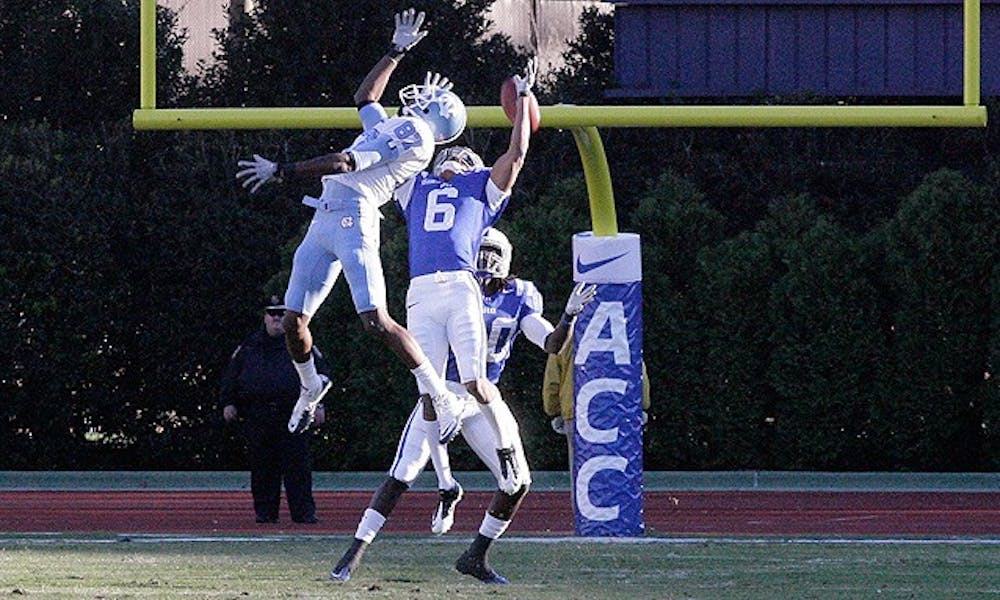The first time that I put pen to paper this year was to opine that the 2010 football season was a make-or-break season for head coach David Cutcliffe and his Duke football program.
Perhaps ironically, as I write my last column of the year, my opinion has changed. This season’s regression was not that drastic.
In recanting my early season proclamation that it was bowl game or bust for the Blue Devils, I think I am demonstrating a certain level of wisdom gained through watching 11 football games this year.
Much of my early season optimism for the team was based on the fact that at one point last year, Duke was 5-3 and on the doorstep of qualifying for its first bowl game since 1994. Even though these postseason hopes flamed out in November against some of the conference’s toughest competition, a 5-7 mark was a great success in Cutcliffe’s second season. Support and optimism for the program was as high as it has been in recent memory, and after Cutcliffe decided to stay in Durham despite an offseason that saw him flirt with the Tennessee job, expectations were heightened further.
Yet, in reality, graduated quarterback Thaddeus Lewis meant more to last season’s team than can ever be quantified. On his way to passing for over 10,000 yards for his career, Lewis turned an offense with average playmakers and no semblance of a running game into a yardage-piling, point-scoring machine. This machine was proficient enough to overcome a defense that ranked in the bottom half of the nation in most statistical categories.
Many observers expected highly-touted redshirt sophomore Sean Renfree to step right in and pick up where Lewis left off, as he did admirably in a comeback victory against Army when Lewis went down with an injury. However, such forecasts were probably unreasonable given that the Arizona native underwent major reconstructive knee surgery in the offseason and had thrown just 50 passes at the season’s beginning.
And, with the up-and-down season in the books, it is apparent why these expectations existed and also why they were far too high. His brilliant 28-for-30 performance for 314 yards in a road win against Navy is support for the former. But, just two weeks earlier, he went 18-for-38 with five interceptions against Miami to give more credence to the latter argument.
On the whole, I would say Renfree’s season was promising, especially given his strong play in the season’s second half. The middle of his season was characterized by a terrible slump that began with his poor showing against Alabama. (I chalk that rut up to the Crimson Tide defense damaging the psyche and confidence of a quarterback who wasn’t ready to face that caliber of competition.)
Also encouraging for Renfree is that all of the weapons around him will be returning. His top two targets in Conner Vernon and Donovan Varner will be back. As will tight end Cooper Helfet, who emerged down the stretch as a real third-down threat, hauling in 28 balls for 339 yards over the season’s final five games.
Perhaps the most encouraging sign on the offensive side of the ball was the emergence of a ground game. In 2009, Duke averaged just 2.2 yards per carry, a number that jumped to 3.4 yards per attempt in 2010. Beyond the numerical lift, both Desmond Scott and Josh Snead emerged as young running backs both capable of picking up the tough yards and with the potential to break big runs. With an offensive line returning three starters, the offense should only become more balanced and continue to see more efficiency on third down and in the red zone.
Beyond Renfree’s midseason struggles protecting the ball, the Blue Devils’ main downfall was its defense, which statistically was one of the worst among major conference teams. For a unit that gave up 35 points and 450 yards per game, numbers far worse than those posted in 2009, it is hard to pinpoint exactly which area needs to improve. The bottom line is that the group needs to get better at every position and continue to put more emphasis on recruiting faster, stronger athletes.
The upside is that with the exception of Abraham Kromah, none of the five starters that will be lost to graduation would have been considered part of the solution. Youngsters Kelby Brown, Ross Cockerell and Walt Canty emerged as starters and demonstrated improvement as the season went along. Still, before any Duke team can achieve consistent success, its defensive unit will need to become much better at both pressuring the quarterback and forcing turnovers, two areas where this year’s team ranked among the nation’s worst.
It is easy to be critical of Cutcliffe and his staff for failing to build on last year’s momentum, but they managed to sustain it despite the graduation of a game-changing quarterback. While this season should not be considered a success, give the man some more time with players he recruited. I expect a bowl game before Renfree graduates, and Duke’s chances have never been better.
Get The Chronicle straight to your inbox
Signup for our weekly newsletter. Cancel at any time.

